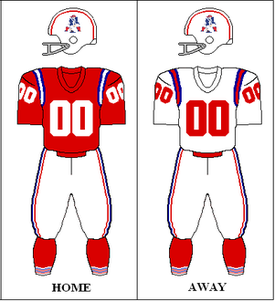The 1980 CFL season is considered to be the 27th season in modern-day Canadian football, although it is officially the 23rd Canadian Football League season.
The 1979 CFL season is considered to be the 26th season in modern-day Canadian football, although it is officially the 22nd Canadian Football League season.
The 1978 CFL season is considered to be the 25th season in modern-day Canadian football, although it is officially the 21st Canadian Football League season.
The 1977 CFL season is considered to be the 24th season in modern-day Canadian football, although it is officially the 20th Canadian Football League season.
The 1976 CFL season is considered to be the 23rd season in modern-day Canadian football, although it is officially the 19th Canadian Football League season.
The 1975 CFL season is considered to be the 22nd season in modern-day Canadian football, although it is officially the 18th Canadian Football League season.
The 1974 CFL season is considered to be the 21st season in modern-day Canadian football, although it is officially the 17th Canadian Football League season.
The 1973 CFL season is considered to be the 20th season in modern-day Canadian football, although it is officially the 16th Canadian Football League season.
The 1972 CFL season is considered to be the 19th season in modern-day Canadian football, although it is officially the 15th Canadian Football League season.
The 1971 CFL season is considered to be the 18th season in modern-day Canadian football, although it was officially the 14th Canadian Football League season.
The 1964 CFL season is considered to be the 11th season in modern-day Canadian football, although it is officially the seventh Canadian Football League season.
The 1966 CFL season was the Canadian Football League's ninth season since the 1958 merger of the Interprovincial Rugby Football Union and the Western Interprovincial Football Union to create a national league. It was the 13th season in modern-day Canadian football.
The 1965 CFL season is considered to be the 12th season in modern-day Canadian football, although it is officially the eighth Canadian Football League season.
The 1972 CFL Draft composed of nine rounds where 70 Canadian football players that were chosen exclusively from eligible Canadian universities. The Montreal Alouettes, who had the worst record in the Eastern Conference in the previous season, had the first overall selection.
The 1973 CFL Draft composed of nine rounds where 93 Canadian football players were chosen from eligible Canadian universities and, for the first time, Canadian players playing in the NCAA. Prior to 1973, teams were given exclusive signing privileges to Canadian players who attended U.S. schools based on the territory he was domiciled. After the draft was expanded to include NCAA schools, teams were also permitted to exempt from the draft and select players from their area, regardless of where they attended school.
The 1975 CFL Draft composed of eight rounds where 81 Canadian football players were chosen from eligible Canadian universities and Canadian players playing in the NCAA. A total of 16 players were selected as territorial exemptions, with the Montreal Alouettes being the only team to make no picks during this stage of the draft. Through a trade with the Calgary Stampeders, the Winnipeg Blue Bombers selected first overall in the draft. They would not choose first overall again until the 2011 CFL Draft.
The 1976 CFL Draft composed of 10 rounds where 106 Canadian football players were chosen from eligible Canadian universities and Canadian players playing in the NCAA. A total of 18 players were selected as territorial exemptions, with the Calgary Stampeders being the only team to make no picks during this stage of the draft. Through a trade with the Toronto Argonauts, the Edmonton Eskimos selected first overall in the draft. The Eskimos had four total picks in the first round of the draft alone.
The 1978 CFL Draft composed of eight rounds where 90 Canadian football players were chosen from eligible Canadian universities and Canadian players playing in the NCAA. A total of 18 players were selected as territorial exemptions, with the Toronto Argonauts being the only team to make no picks during this stage of the draft.
The 1980 CFL Draft composed of seven rounds where 80 Canadian football players were chosen from eligible Canadian universities and Canadian players playing in the NCAA. A total of 18 players were selected as territorial exemptions, with all nine teams making at least one selection in this stage of the draft.
